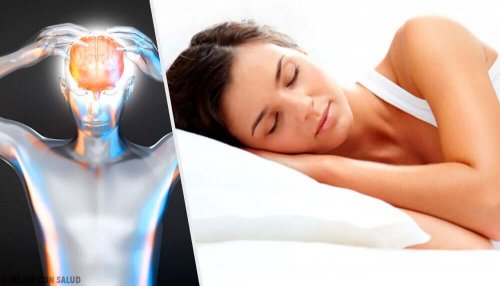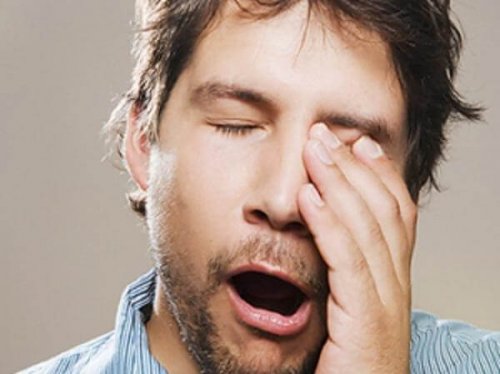Appropriate Sleeping Hours by Age

Experts now know that sleep patterns change depending on the stage of life. That’s why there are appropriate sleeping hours for every age, since your body’s needs and lifestyle change over time.
Thus, it’s very important to get enough sleep according to your age. Not sleeping enough can have consequences. However, oversleeping isn’t advisable either. Sleep is a fundamental process for proper functioning, especially of the brain.
The amount of time that each person should sleep depends on many factors. Yes, there are appropriate sleeping hours by age, but this is only a general indicator. In particular cases, there may be variations depending on the individual’s circumstances and condition.
The importance of getting enough sleep
The appropriate sleeping hours by age aren’t exact. Actually, it’s very difficult to exhaustively determine the precise ranges. Some young adults get by perfectly with six hours of sleep, while others need to sleep nine hours.
Knowing if you’re sleeping enough depends more on the signs that you’re not getting enough rest. In general, when a person feels drowsy and irritable during the day, they’re probably not getting enough rest. Likewise, when someone wakes up in the morning and falls asleep again within minutes, they probably didn’t get a good night’s sleep.
A very reliable test to determine how much sleep you need is to sleep for 15 days without any restrictions or distractions (you can do this on vacation). If you don’t have a sleep disorder and your sleep times are regular at the end of this period, it’s safe to assume that you’re getting enough sleep.

Read on: Improve Your Sleep Quality with these Healthy Bedtime Habits
Appropriate sleeping hours by age
However, as we noted above, appropriate sleeping hours vary depending on our age. The National Sleep Foundation (NSF) presented a list with the minimum and maximum sleeping hours for each age group. It’s based on the latest scientific research on the subject.
Based on that report, the appropriate sleeping hours by age are the following:
- Newborns (0-3 months): Between 14 and 17 hours.
- Babies (4-11 months): Between 12 and 15 hours.
- Toddlers (ages 1-2): Between 11 and 14 hours.
- Preschool age children (ages 3-5): Between 10 and 13 hours.
- School-age children (ages 6-13): Between 9 and 11 hours.
- Adolescents (ages 14-17): Between 8 and 11 hours.
- Young adults (ages 18-25): Between 7 and 9 hours.
- Adults (ages 26-64). Between 7 and 9 hours.
- Elderly or older adults (ages 65 and up): Between 7 and 8 hours.
Why does age influence sleeping hours?

Babies need more sleep than adults because it’s essential for their proper physical and psychological development. During sleep, children’s bodies produce more growth hormones. This is essential to modulate the growth of organs and the maturation of the nervous system. Also, babies and children are constantly learning. Sleep is the only thing that allows them to organize and consolidate the information they received during the day. As they grow and mature, they need less sleeping hours.
In turn, during adolescence, there’s a temporary imbalance of the circadian rhythm, which is a kind of internal biological clock. This leads them to fall asleep later in the night and, therefore, to have a harder time waking up early. As we grow older, we need less sleep.
Find out more here: 8 Easy Ways to Fight Sleep Disorders
The grandpa-who-doesn’t-sleep-well hypothesis
A study published in an important academic journal states that one of the reasons why sleep patterns change with age could be an evolutionary adaptation. That possibility is known by the name of the grandpa-who-doesn’t-sleep-well hypothesis
According to it, one of the factors that helped our ancestors survive was the fact that a person stayed awake at night. As older adults performed fewer daytime activities, and surveillance didn’t involve extraordinary demands, they were responsible for carrying out that function.
In primitive communities, it’s been found that older people go to bed much earlier and wake up at dawn. This could be an inherited behavior of our human ancestors that supports the explanation about why sleeping hours change with age.
All cited sources were thoroughly reviewed by our team to ensure their quality, reliability, currency, and validity. The bibliography of this article was considered reliable and of academic or scientific accuracy.
- Miró, Elena e Iáñez, Ma. Angeles y Cano-Lozano, Ma. del Carmen (2002). Patrones de sueño y salud. Revista Internacional de Psicología Clínica y de la Salud, 2 (2), 301-326. [Fecha de consulta 7 de junio de 2020]. ISSN: 1697-2600. Disponible en: https://www.redalyc.org/articulo.oa?id=337/33720206
- National Sleep Foundation. “Nuevos tiempos de sueño”. https://www.sleepfoundation.org/press-release/national-sleep-foundation-recommends-new-sleep-times/page/0/1.
- Samson, DR, Crittenden, AN, Mabulla, IA, Mabulla, AZP y Nunn, CL (2017). La variación del cronotipo impulsa el comportamiento nocturno centinela en cazadores-recolectores. Actas de la Royal Society B: Biological Sciences, 284 (1858), 20170967. https://doi.org/10.1098/rspb.2017.0967.
- Solari, BF (2015). Trastornos del sueño en la adolescencia. Revista Médica Clínica Las Condes, 26 (1), 60–65. https://doi.org/10.1016/j.rmclc.2015.02.006.
This text is provided for informational purposes only and does not replace consultation with a professional. If in doubt, consult your specialist.








